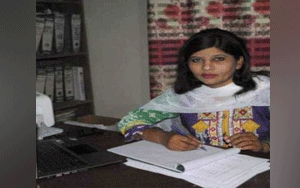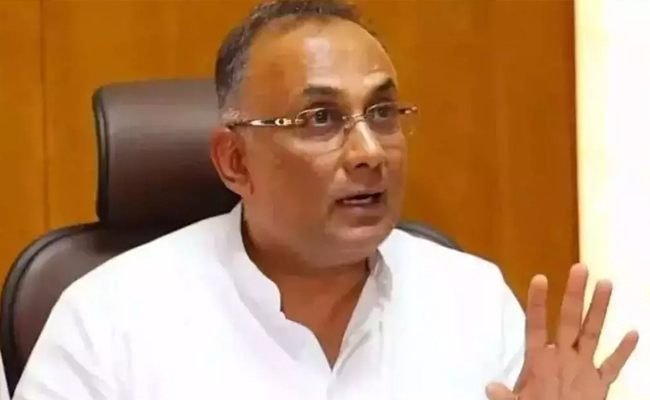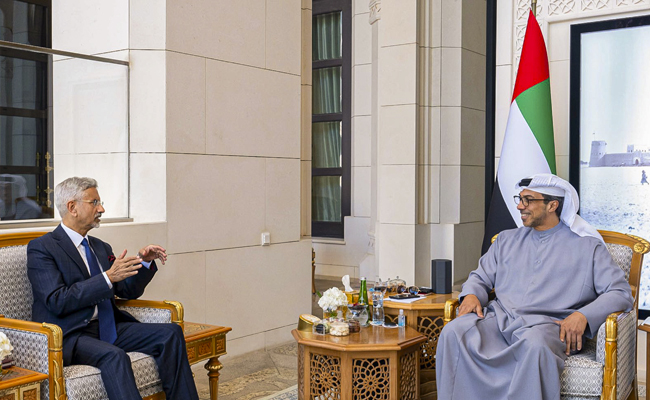Islamabad, July 24 : Krishna Kumari Kohli, a female senator from Pakistan's Sindh province, became a focus of local media and people a few months back for her being the first woman lawmaker from a low-cast non-Muslim tribe in the Upper House of the country.
Kohli told Xinhua news agency that her entry into the Senate will open new doors for women as they will see her as a role model and a beacon of hope to achieve their dreams.
"I am daughter of a poor tenant and spent a part of my childhood as a bonded labourer, but my hard work and honesty to my cause of changing my life and life of people around me has landed me in the Senate. If I can do it, other women who are more educated and privileged than me can do it even better than me," she said.
A few months on, a woman from the same Thar district where Kohli belongs, is all set to contest elections on Wednesday for the provincial assembly of Sindh.
A tailor by profession, the provincial assembly candidate Sunita Parmar said in a viral video on social media that she was keen to protect the interests of women and work to release them from the shackles of poverty and ignorance.
"I want to change the condition of women in my area. I want to work for girls' education and play my role in providing basic health facilities to them. Political parties should accept women's existence and capabilities, as it is the need of the hour," she said in the video.
The Election Commission said that this year, political parties have fielded women candidates in conservative areas.
Hameeda Shahid is one such candidate from Dir district of the country's northwestern Khyber Pakhtunkhwa province, Xinhua reported.
Women were previously not allowed to leave the house to vote, but Shahid is determined that she will change it by motivating women to stand up for their rights. She said that women should join politics so that their fellows could detail their problems to them, which they cannot tell male lawmakers.
The mother of six added that she doesn't have any experience in politics. However, if she wins the election, she will work for women's rights in her area.
According to the country's law, it is mandatory for all political parties to allocate at least 5 per cent of its seats to women candidates. The recently released figures of the poll body showed that 11,885 candidates will contest elections. Out of which, there are 305 women candidates which makes about 5.2 per cent of the total ticket holders contesting from political parties.
Apart from this, there are 60 reserved seats for women in the National Assembly for which women from different political parties are selected according to the number of seats they win.
Tanzeela Mazhar, a journalist from Islamabad, said that despite the fact that women are contesting, the chances of victory for most of the candidates are slim.
"Political parties were sure about their defeat in certain constituencies and to fulfil the 5 per cent mandatory quota for women representatives, they fielded women from those constituencies while keeping the strong constituencies for the male candidates."
Despite that, the Election Commission said that the elections will see the highest number of women candidates contesting for the National Assembly seats in Pakistan's electoral history.
As many as 171 women candidates will be in the run against 272 seats of the National Assembly. In 2013, 135 women contested the poll.
Let the Truth be known. If you read VB and like VB, please be a VB Supporter and Help us deliver the Truth to one and all.
New Delhi: A bill to set up a 13-member body to regulate institutions of higher education was introduced in the Lok Sabha on Monday.
Union Education Minister Dharmendra Pradhan introduced the Viksit Bharat Shiksha Adhishthan Bill, which seeks to establish an overarching higher education commission along with three councils for regulation, accreditation, and ensuring academic standards for universities and higher education institutions in India.
Meanwhile, the move drew strong opposition, with members warning that it could weaken institutional autonomy and result in excessive centralisation of higher education in India.
The Viksit Bharat Shiksha Adhishthan Bill, 2025, earlier known as the Higher Education Council of India (HECI) Bill, has been introduced in line with the National Education Policy (NEP) 2020.
The proposed legislation seeks to merge three existing regulatory bodies, the University Grants Commission (UGC), the All India Council for Technical Education (AICTE), and the National Council for Teacher Education (NCTE), into a single unified body called the Viksit Bharat Shiksha Adhishthan.
At present, the UGC regulates non-technical higher education institutions, the AICTE oversees technical education, and the NCTE governs teacher education in India.
Under the proposed framework, the new commission will function through three separate councils responsible for regulation, accreditation, and the maintenance of academic standards across universities and higher education institutions in the country.
According to the Bill, the present challenges faced by higher educational institutions due to the multiplicity of regulators having non-harmonised regulatory approval protocols will be done away with.
The higher education commission, which will be headed by a chairperson appointed by the President of India, will cover all central universities and colleges under it, institutes of national importance functioning under the administrative purview of the Ministry of Education, including IITs, NITs, IISc, IISERs, IIMs, and IIITs.
At present, IITs and IIMs are not regulated by the University Grants Commission (UGC).
Government to refer bill to JPC; Oppn slams it
The government has expressed its willingness to refer it to a joint committee after several members of the Lok Sabha expressed strong opposition to the Bill, stating that they were not given time to study its provisions.
Responding to the opposition, Parliamentary Affairs Minister Kiren Rijiju said the government intends to refer the Bill to a Joint Parliamentary Committee (JPC) for detailed examination.
Congress Lok Sabha MP Manish Tewari warned that the Bill could result in “excessive centralisation” of higher education. He argued that the proposed law violates the constitutional division of legislative powers between the Union and the states.
According to him, the Bill goes beyond setting academic standards and intrudes into areas such as administration, affiliation, and the establishment and closure of university campuses. These matters, he said, fall under Entry 25 of the Concurrent List and Entry 32 of the State List, which cover the incorporation and regulation of state universities.
Tewari further stated that the Bill suffers from “excessive delegation of legislative power” to the proposed commission. He pointed out that crucial aspects such as accreditation frameworks, degree-granting powers, penalties, institutional autonomy, and even the supersession of institutions are left to be decided through rules, regulations, and executive directions. He argued that this amounts to a violation of established constitutional principles governing delegated legislation.
Under the Bill, the regulatory council will have the power to impose heavy penalties on higher education institutions for violating provisions of the Act or related rules. Penalties range from ₹10 lakh to ₹75 lakh for repeated violations, while establishing an institution without approval from the commission or the state government could attract a fine of up to ₹2 crore.
Concerns were also raised by members from southern states over the Hindi nomenclature of the Bill. N.K. Premachandran, an MP from the Revolutionary Socialist Party representing Kollam in Kerala, said even the name of the Bill was difficult to pronounce.
He pointed out that under Article 348 of the Constitution, the text of any Bill introduced in Parliament must be in English unless Parliament decides otherwise.
DMK MP T.M. Selvaganapathy also criticised the government for naming laws and schemes only in Hindi. He said the Constitution clearly mandates that the nomenclature of a Bill should be in English so that citizens across the country can understand its intent.
Congress MP S. Jothimani from Tamil Nadu’s Karur constituency described the Bill as another attempt to impose Hindi and termed it “an attack on federalism.”



_vb_22.jpeg)

